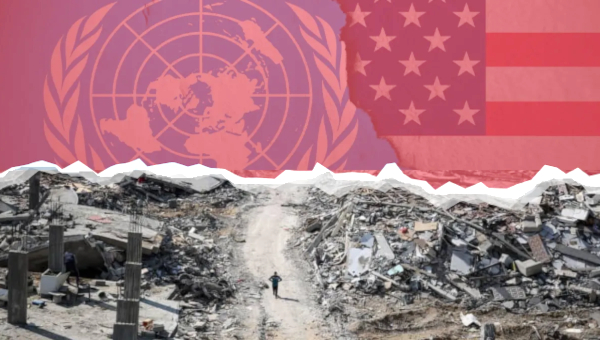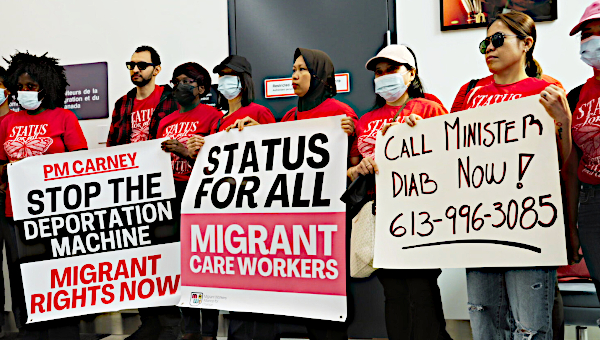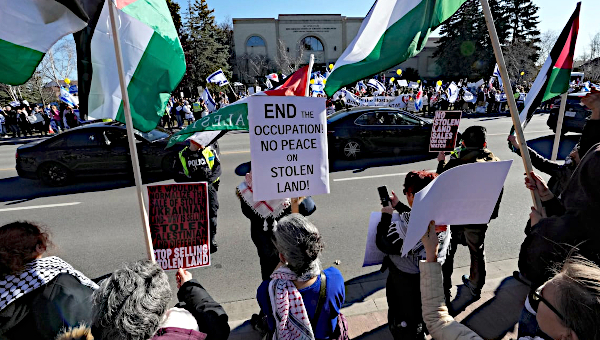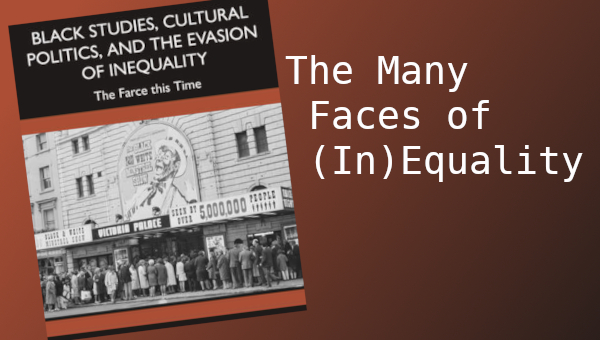We Are in a Fight for Life
This talk was given by Avi Lewis as the opening keynote at the Parkland Institute’s 27th Annual Fall Conference “Alberta at the Crossroads: Building the World We Want,” in Edmonton on November 17, 2023. The original intent was for Lewis to address the role of inspiring political visions to build momentum for transformative change. After October 7, the talk took a different turn. Photos by Cecilie Surasky.
It is truly good to be here with you all on Treaty Six territory. I want to start with gratitude for the framing of this conference: we are at a crossroads, one of those moments of tectonic shift, existential threat, and potential. One of those moments that feels like a turning point we’ll be looking back at in years to come. One of those moments when what we say and do matters more than ever.
So, I’d like to spend much of my time tonight surveying this new terrain of collective, contesting trauma and pain that we suddenly find ourselves in – and the huge stakes it lends to any shared progressive project going forward.
In the last act of my talk, I’ll shift gears and turn to the rich feast of policy wonkery we’re going to enjoy together over the next two days – I have some framing thoughts that I hope will be helpful.
In particular, I want to reflect on the kind of political path and power we need to build together in order to take the policy visions articulated by the fabulous speakers at this conference and turn them into real and lasting change – to transform the material conditions in which people live and work on these lands.
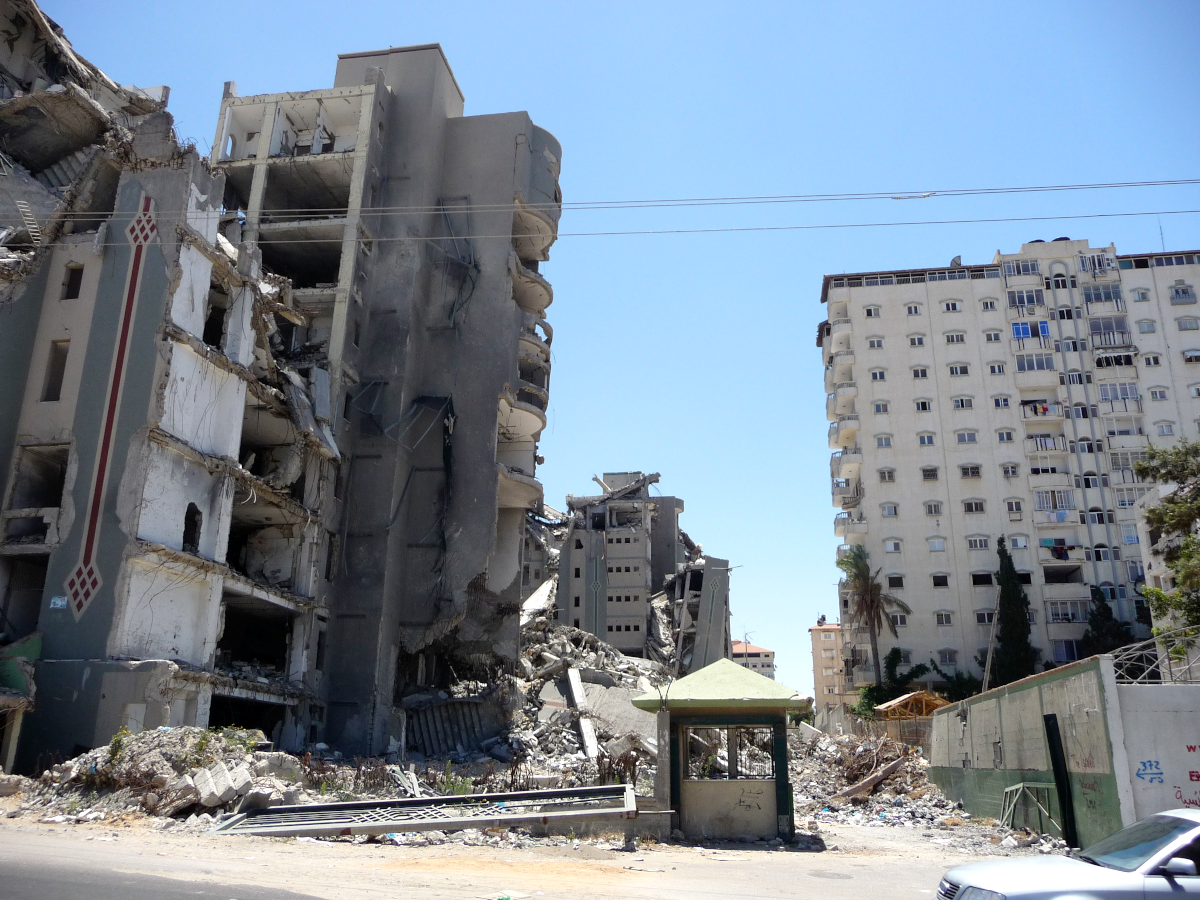
But let’s start where we are. And let me start with a question I believe may be ricocheting around inside many of you at the outset of this conference: how can we talk about housing and transit and climate and taxes and healthcare without first acknowledging that as we sit here in comfort and safety, Israeli bullets and bombs continue to extinguish life and level buildings in Gaza for a sixth consecutive week?
Bullets and bombs and guidance systems and drones that are sold by a handful of rich colonial nations like Canada and the US, and come bundled with diplomatic cover at the United Nations.
Because these genocidal war crimes in progress are causing shock and outrage and making it seemingly impossible to sleep at night for anyone with the courage to look – really look – at what’s going on in Gaza. And what happened in Israel on October 7th.
It is hard to get clarity through the fog of war rolling out from the conflict zone and blanketing the earth. A thick pall of longstanding Islamophobia and anti-Palestinian racism blankets our public discourse, where real acts of antisemitism – like shots fired at synagogues – are conflated with legitimate and morally urgent protest against the actions of the state of Israel.
And our governments at every level are sticking to a one-sided script, huddling in the supposed safety of condemning terrorism and antisemitism while weakly calling for “humanitarian pauses” in the midst of ongoing crimes against humanity.
Our political leaders are once again demonstrating that they inhabit another universe, a mirror world of sterile official facts and calculations, utterly detached from the raw emotions roiling the populace.
It’s a surreal time in so many ways, made infinitely weirder and worse by the reactive, angry algorithms of social media in which too many of us over-marinate. For one thing, can anyone remember another prolonged political moment when the universal currency of exchange suddenly became condemnation?
Many who have condemned Israel’s indiscriminate killing of civilians have themselves faced condemnation – for not condemning Hamas first and foremost.
By one week in, we all watched people get canceled online for… condemning the wrong things. Or condemning them with the wrong words. Or even for condemning the right things but in the wrong order!
We are suddenly in a season of mass and mutual denunciation – a meta-contest that ends up in the absurd spectacle, particularly on university campuses, of people denouncing the denunciations found in statements that have now themselves faded into the denunciatory sunset.
I get it though. I think all this lashing out is an understandable consequence of the fact that we all feel so powerless – watching a continuous loop of atrocity on our screens. Or strenuously avoiding watching. Both exact an extreme psychic toll.
Because whether avoiding or indulging, we’re all absorbing a huge quantity of unspeakable violence into our very bodies, without having any way to discharge it. So, we post and post – or just scroll and scroll – and yet nothing seems to erase the nightmare images from the inside of our closed eyelids.
And there is so much fodder for nightmares to go around. Parents executed in front of their children, children executed in front of their parents. Thousands of lives snuffed out. Thousands more trapped under rubble, dying slowly, with more rubble and more victims being created faster than any rescue attempt can keep up with. Especially with no power, no water, no fuel, no food.
You can see how many people are experiencing this searing collective shock in the ever-growing multitudes on the streets – a moment of mass protest that is both heartening and in itself an important political juncture.
This spreading revolt calling relentlessly, powerfully for a ceasefire. And of course, that must just be the start – the ceasefire call needs to expand to the demand for a political resolution to the conflict and its root cause: the untenable occupation and apartheid policies of Israel.
Let me pause here to do a quick disclaimer: if there are fellow progressives in this room who are uncomfortable with the kind of language I’m using – words like apartheid and genocide, used to describe the policies and actions of the state of Israel – please at least know that I don’t use them merely to provoke.
I don’t seek to use this platform to attack those with whom I disagree – there’s plenty of that going around at the moment.
I guess this is a trigger warning of sorts – if you’re already upset by what I’ve said, I think you’ll find it’s going to get harder.
Because I do feel an absolute moral obligation to name this moment from my own Jewish perspective – the perspective of one of those people whom Israel says it is keeping safe by reducing Gaza to bloody ruin.
And that means saying that 75 years after the foundation of the state of Israel, which meant the expulsion of some 750-thousand Palestinians from their homes, Israel must be made to abide by international law.
That means Palestine must be liberated – not just from war and siege. But from illegal settlements, from the demolition of houses and olive groves. From checkpoints and outposts and administrative detention and torture and second-class roads and services and the absence of the right to assemble, to free speech, to free movement. Palestine and Palestinians must be free.
Saying these things aloud in public feels incredibly important right now, here in Alberta, at a conference of the venerable Parkland Institute. As progressive organizers, policy nerds, and activists, we have to come to grips with this historic moment, identify the fundamental messages it is sending us, try to articulate how we can build a new political possibility out of this inflection point in national and global affairs.
And I think there are some core connections to be drawn. But rather than offering a whole lot of analysis, I’d actually like to speak personally about these things for the next few minutes.
I do so with some trepidation – I’ve never spoken publicly at any length about my own relationship to Israel, Zionism, and antisemitism.
But I feel this is the moment to do so, and I hope I’m right in guessing that this is the right room in which to disclose and speak my truth.
I also feel – I mean, I certainly hope – that there are a lot of Jews of my generation who have had similar experiences, and a similar journey. And I feel called – in this moment – to stand up as a Jewish person and say: Not in my name. Never again means never again for anyone.
That’s important because I can see that this moment of violence and atrocity in Israel-Palestine is in danger of splitting progressive movements and organizations, as many Jewish progressives are visibly seized right now by an atavistic conviction that antisemitism is to be found everywhere there is solidarity with Palestinians.
That hatred of Jews is lurking in every chant and demo and direct action calling for Ceasefire.
To be clear, I don’t think that’s what’s happening. Not at all. There is, of course, antisemitism surging in this moment – like the dehumanization of Palestinians is surging – and any incidents of Jew hatred or Palestinian hatred must be called out, cannot be tolerated.
But for me, these amped-up expressions of fear on the part of some progressive Jews are jarringly at odds with who is being targeted and bombed and killed and erased right now.
And that is not happening to Jews in the diaspora. It’s happening to Palestinians in Gaza and with increasing intensity, on the West Bank.
My own conviction is that fighting antisemitism cannot be pried apart from other anti-racist struggles. That the fight to dismantle hatred of Jews belongs in a big broad fight against racism and ongoing colonialism in all forms. Every identity-based prejudice has unique qualities, of course. But we are all stronger when we fight together.
So, as you may have guessed, I’m not a Zionist. At this point, if I had to choose a label it would be: post-Zionist. Because like most Jewish people, I’ve had a lifelong engagement with the politics of Zionism, one that has shifted over decades.
This reflects the fact that Zionism has a history as a contested ideology within the global Jewish community. In fact, my family’s political tradition – going back to the 1890s – was once locked in a battle against Zionism.
My grandfather David Lewis, as many of you know, was an early leading figure in the Cooperative Commonwealth Federation (CCF), serving as general secretary of the CCF from 1936 all the way to 1950, and was later a key figure in the founding of the New Democratic Party (NDP) and federal leader for four years in the early 1970s.
David’s politics around Israel-Palestine moved back and forth across the Zionist line over the course of his lifetime. But he was brought up in the tradition of the Jewish Labour Bund – a socialist movement of the late 19th and early 20th century in Russia and Eastern Europe.
The Bund was a remarkable organization, worthy of the new interest it now enjoys, and a huge influence on my own ideas about what’s required for fundamental change. You could think of the Bund as an entity that was at once a social movement, a trade union, a political party, as well as a cultural and artistic space. Oh, and also a militia!
David’s father, my great grandfather Moishe, was a leader in the Bund in his town of Svisloch – which would now be in Belarus. At the time, the Bundists were sworn political enemies of Zionists, who wanted to depart the European landscape of antisemitism and build a Jewish state in Palestine.
Bundists disagreed, vehemently. A core principle of Bundism was what they called “Doi’kayt” or “here-ness.” The idea was that Jews should fight for revolutionary change where they lived and worked and had roots. A vision of building power for a socialist transformation of society within the existing body politic – as part – a visibly Jewish part, but still a part of what we would today call a multi-racial, multi-generational movement.
This obviously didn’t fit in any way with the vision of Zionism. And so there were fierce debates sometimes escalating to physical conflicts between the two groups.
There was even a cheeky Bundist song, “Oy Ir Narishe Tsienistn / Oh You Foolish Little Zionists.” I’ll spare you the mournful melody, but the key couplet of the song goes,
“You want to take us to Jerusalem
So we can die as a nation
We’d rather stay in the Diaspora
And fight for liberation.”
But my family has a strong strain of Zionism in it too. I bear the Israeli name Avi because my mother Michele Landsberg spent her 18th year on a Kibbutz in Israel, and her youthful imagination was captured by the idea that Jews could build a socialist utopia in the desert.
She’s come a long way in her own journey – she recently spoke at a panel about Canadian Media and Palestine, put on by Independent Jewish Voices – and apparently brought the house down. So that gives you an idea of where she’s landed.
As for me, my own story seems entangled with fate – or at least historical coincidence.
I was born on May 15th. In 1948, that was a momentous date in Israel-Palestine. Israel had declared its Independence the day before, sparking the Arab-Israeli war on the 15th. And of course, for Palestinians, that declaration was the beginning of the Nakba, or catastrophe.
The particular May 15th I was born on – in 1967 – was just 3 weeks before Israel took over East Jerusalem and the West Bank from Jordan in the 6-day War. In other words, The Occupation – the longest ongoing military occupation on earth – began when I was 3 weeks old.
As a child of the 70s, I was brought up with all the powerful myths of Zionism. Israel as a place where Jews could run to for safety if another Hitler ever rose up to extinguish us. As well as the violent colonial lie that it was a land without people for a people without land.
Early experiences of antisemitism reinforced those powerful stories. When I walked through the doors of my first elementary school in Scarborough, Ontario, in 1972, there was a swastika carved half an inch deep in the wood. It stayed there all year as my older sister and I were terrorized by an antisemitic bully and his crew – it got so bad that they had to take us out of school for the last few months of the year.
At the age of 18, carrying these inherited positions and searching for my own path in life, I even imagined that if there were another war in the Middle East that I would nobly go and fight for Israel. Such is the power of a western heroic narrative, in all its colonial glory. I’m not proud of that moment. But it’s part of my formation.
Soon after, I began to learn. That my bar mitzvah gifts – trees planted in my name by the Jewish National Fund in Israel – were blooming on the sites of Palestinian villages that had been emptied and razed in 1948. That the erasure of Palestinian life was literally being greenwashed in my name.
My education deepened in the late 90s, when I hosted counterSpin, a debate show on CBC Newsworld. One of the big stories of the day was the negotiation of the Oslo Accords.
It was argued by many of my most convincing guests that Israel had no intention of trading land for peace, and that the Oslo agreement – far from its stated goal of leading to a 2-state solution, was actually designed to lock in Israel as the sole viable state. I think the situation today is overwhelming proof that this was the case – and leading politicians, including Benjamin Netanyahu have recently admitted as much.
Two days ago, Israel blew up the Palestinian parliament building in Gaza – adding a crushing exclamation point to this argument.
I’ve actually been to Gaza, and it was yet another turning point in my own education. It was in 2009, six months after the devastating bombardment known as Operation Cast Lead. I was there as a member of the press.
It was confusing that they let us in – I was traveling with my partner Naomi Klein, at the time one of the most well-known Jews to publicly join the call from Palestinian civil society for Boycott, Divestment, and Sanctions against Israel. Also with us was our friend Cecilie Surasky, at the time Deputy Director of JVP – Jewish Voice for Peace – one of the groups currently mobilizing those huge direct actions of Jews against genocide in the US.
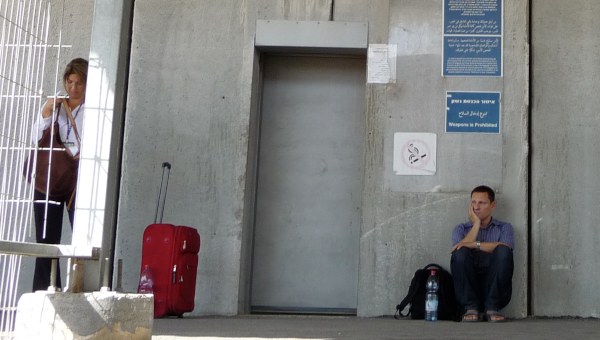
That trip was unforgettable in so many ways. We met Gazans who had lost their entire extended families in a single explosion. Walked past government buildings in the center of Gaza City that had been reduced to rubble – a brutal foreshadowing of the situation today in which vast swaths of the built environment and civil infrastructure of Gaza are just absolutely levelled, erased.
At the end of that trip, leaving Gaza, I had an encounter with a couple of Hamas… I guess you would call them “border guards.” Not your traditional idea of a border though, and the guards were guys in track suits with guns.
Between Israel and Gaza there was wide, scrubby no-man’s land with a chain-link fenced-in corridor. At one end was Israel, the Eres checkpoint. It’s a mammoth concrete structure, built to process more than 10,000 Palestinian workers a day, except that Gaza was put under siege and the cheap labour was largely locked on the other side of the wall.
At the other end was the Gaza side – a shipping container, empty except for a battered desk with the two guys behind it and a metal chair, where I sat for about 45 minutes as they questioned me. It was tense and scary.
There was confusing talk that they might insist on vaccinating me before I could leave the container, which I was not excited about. Mostly it seemed they were stuck on the fact that I had a Canadian passport but an Israeli name. They were utterly uninterested in the two women I was traveling with. Eventually, they let us through.
My experience with the Israeli border was as asymmetric as the two structures themselves. I won’t tell you the long version, but after many, many hours waiting in a concrete maze outside an elevator with no call button, we were finally let in to be processed – it was like being the only travelers in a giant empty airport.
Once again, the officials seemed totally uninterested in Naomi and Cecilie – the casual misogyny was the thread that connected the two very different experiences.
I was taken up to the very top floor of the facility, down corridor after corridor to the corner office where I was introduced to the commander of the checkpoint – a Brigadier-General if I remember correctly – who took me to the window, and pointed out at a squadron of tanks moving around in formation.
He said, “We know you don’t like us, you’re against what we do. But do you have any idea of how much danger you were in, going in there? We were mobilizing a whole army division to go into Gaza and rescue you. Yeah, even though you hate us, we would still save your life. Because you are a Jew.”
Because you are a Jew.
I have been processing those five words for fifteen years. In the moment, they just felt like a manipulative mindfuck. It didn’t help when he added, “and keep your woman under control, ok? She’s going to get herself in trouble one of these days.”
I mean, barf. But also: how revealing. A whole worldview was transmitted in that short exchange: Patriarchy, check. The victim become victimizer, check. The power of those with the biggest guns to rank human life: check.
The message to me has become clearer and clearer over the years: he was telling me that my life had intrinsic value. That I was special. That I was worth a huge amount. That I would be protected, resources would be mobilized, lives would be risked – all because my life, my Jewish life, was so precious. Even as a dissident, who denied my birthright, I was among the chosen.
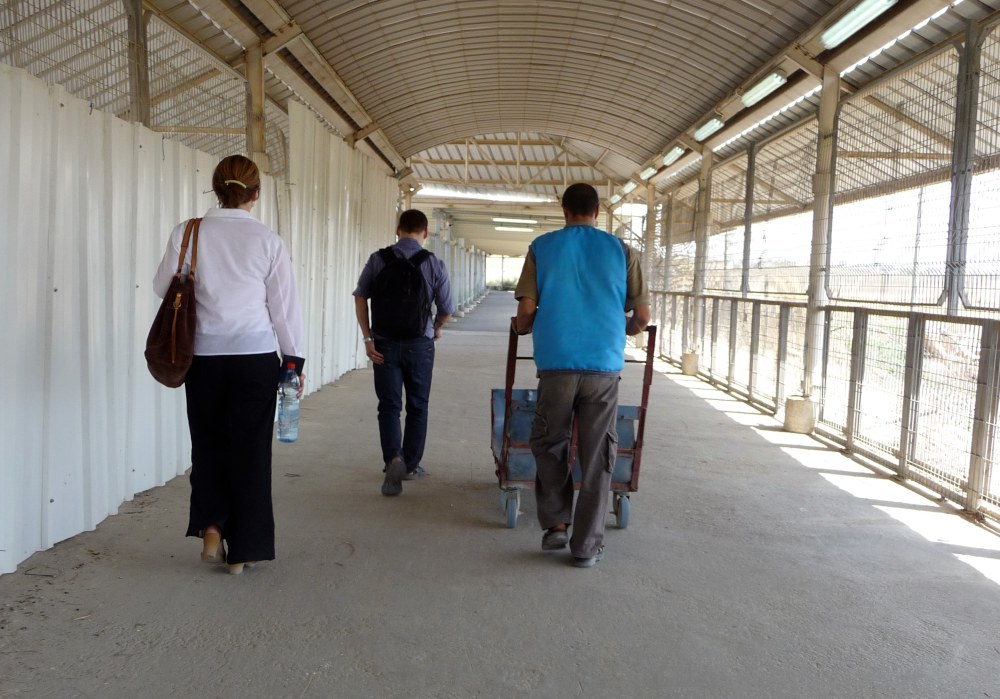
That’s the same message that Israel has been sending in response to the gruesome attacks on civilians on October 7. The apocalyptic fury of retribution and collective punishment – on one level it is just to send that message. That Israel will take ten… or twenty… or thirty Palestinian lives for every Israeli life taken. The exchange rate floats, but it is always exponentially disproportionate. This is not just exceptionalism. The only word for it is supremacy.
A worldview that sees some human beings as inherently valuable while others are less than human. “Human animals,” as Israel’s Defence Minister said. “Children of Light vs Children of Darkness,” as its Prime Minister said. It’s the violent logic of colonialism. It’s the logic that leads to genocide.
It’s also the logic that underlies our whole broken global system today. With epic inequality across human society – allowing a handful of all-powerful corporations to continue their grotesquely profitable ways even as those practices methodically destroy the life support systems for all living things on our shared planet.
It’s the logic that drives the climate emergency, that sustains a pattern of production and consumption in which the countries and communities that have done the least to create the crisis have long been living with its harshest impacts.
A brilliant climate justice think tank called the Climate and Community Project summed it up with compact precision in a powerful statement calling for ceasefire last month. Here’s the quote that will ring through the years for me:
“Apartheid is incompatible with climate justice – and inevitable without it.”
In other words, unless we rapidly build the power to win a world in which every life is equally valuable, the powerful will keep stoking every crisis, while building their fortresses and armed life rafts in which they plan to escape the hell they are creating.
That basic value: that every human life is precious, that our fates are intertwined… that has to be the basis of our action, on every issue, in every fight.
And this is why I make no apologies for mourning the loss of Israeli civilian life on October 7. Both because those horrific killings impacted people I love directly. But also because I will not succumb to the cheapening of life – of any life – because that makes us too much like those we are resisting in this new peace movement we are building in real time.
And this is where I think the current moment of bombing and bloodshed, of surging intolerance but also surging solidarity – this is where I think the fight for the World We Want – to circle back to the conference frame – can find new footing.
This is where, for me, we can start to talk about housing and transit and taxes and healthcare and climate – by recognizing that what unites these fights, what grounds our common struggle, is that most fundamental value that we share: the fierce, relentless, and morally consistent assertion that every life is precious.
That we are in a fight for life. For the right of all beings – human and more-than-human – to a life of decency and dignity.
Those are the existential stakes of our struggle, and the current violence and its ripples around the world must re-ground us in that.
Whether it’s non-market housing or revived public healthcare, climate justice or electoral reform, we all have agency and a role to play in the fight for life. Against the logic of profit and warfare and suffering as an “unfortunate externality” in a system that presents itself as inevitable. But we know it can be transformed.
And so, as we look ahead to the sessions to come this weekend, once again I think it’s worth beginning where we are and acknowledging that… we’re not doing particularly well in that fight. If we’re honest in our assessment of the balance of forces in society, even before this historic bloodshed, we on the left have not exactly been winning.
Whether it’s the housing emergency, the climate emergency, the spiraling cost-of-living crisis driving vast numbers of people into economic desperation, the defunding and increasing privatization of public services from transit to education to healthcare – we have not, as a society, been making a lot of material progress.
Which, of course, is very different from saying that there is no hope or that there aren’t hopeful signs – that there are not latent conditions under which momentum could quickly shift. I think there absolutely are.
But we have to be honest about the need to create gigantic change that benefits the many, not the few – across all sectors at once.
Because that is what is now required, and the longer we as a society delay making those big changes, the bigger the change we will have to make and the less time we will have to make it. As in many things, the whole imperative to get off fossil fuels and get our emissions down is exhibit A on this front. The line on the graph representing the action required gets steeper and steeper the longer we fail to act.
I’ll share a few thoughts about why I think this is – and some directions and strategies we might consider to turn things around. And I want to concentrate on what I hope are concrete and helpful reflections in this moment, not merely indulge in bemoaning the sad state of things.
I mean, if we just wanted a litany of barriers to transformation in the zeitgeist… there are all kinds of conditions we could cite. You know, like the lack of a large, vibrant institutional left in this country, the collapse of faith in collective change led by governments, an information zone that Steve Bannon would proudly observe is flooded with shit.
In our federal political class, the exhausted and flailing federal neoliberal Liberals with their same-old-same-old core of corporate sycophancy. Painted on top, an increasingly chipped and fading progressive rhetorical veneer.
The soaring poll numbers and triumphant success of the rising populist right – with its billionaire superfans and newfound working-class appeal – a freshly painted, gleaming veneer on the same old axe-the-tax small government/big business bullshit that the right has been trotting out since Reagan.
And the NDP… ok, as a once-and-future federal candidate, I will of, course, not fully unburden myself on my view of the party’s shortcomings.
But at the very least I think it’s fair to observe that the NDP is somewhat afflicted at present by a nationwide blanket of second-hand Trudeau hatred thanks to the Supply and Confidence agreement, that thin piece of paper threatening to bind the party’s fate in the next election to that of our incredibly unpopular Prime Minister.
In the meantime, it’s worth noting that the NDP is the only major national party calling for a ceasefire, day after day and with real passion from the floor of the House of Commons. And it seems on the verge of winning much-needed federal anti-scab legislation and even, maybe, just maybe… single-payer Pharmacare.
But still. The barriers to big change are substantial and well-known. So let me share three high level observations about what we’re missing and what I think we need to do to cross the cold expanse of political deep space and start winning. And in keeping with my current political positionality, straddling the boundary between the social movement space and the electoral system, I’ll frame these thoughts in terms of inside/outside.
First, on the inside, we suffer from a striking lack of vision among political parties and the progressive sectors of the political class. We’re missing a bold set of solutions to intersecting crises that,taken together, tell a story of the future we want to live in, that are big enough to actually solve the problems we face and straightforward enough to communicate quickly, without technocratic jargon.
I don’t see any political party at any level anywhere that is able to offer this urgently needed and inspiring vision.
A detailed and vibrantly communicated vision like the Green New Deal. An electrifying, galvanizing call to action that soars into the political conversation on the wings of solidarity and justice, connecting deep emissions reductions with massively expanded universal public services. A vision that foregrounds desperately needed transformations that would create meaningful family-supporting work and improve everyday life for everyone.
Like a national emergency plan for climate justice that leads with vastly expanded mass public transit, local food production, zero emissions housing, a nationalized heat pump and indoor air ventilation industry with publicly-owned and unionized manufacturing, training, installation, and maintenance… in schools, public housing, rental buildings… I mean, don’t get me started on where heat pumps could really lead if we let them.
What we see instead in the political imagination on the progressive side of the equation obviously doesn’t feature this level of ambition.
Now, of course, BC is much better off with an NDP government than the alternative. Alberta certainly was better off under Rachel Notley than it is today, in the hands of true extremists – a deranged gong-show of a government, launching far right trial balloons like the sovereignty act and pulling out of the Canada pension plan that fill the prairie skies, threatening to block out the sun.
I accept – of course – that many important reforms and reversals of previous austerity can be accomplished by governments of the centre left, like the latest generation of NDP governments in the West.
But the emergencies we face are now so deep and so dire that incremental improvements or reversals no longer meet the measure of this historic moment. Whether we’re considering the emergency in housing, affordability of food and basic goods, the collapsing healthcare system, or the unraveling climate looming over and connecting them all – it’s time to go big.
I just can’t understand the goal of progressive parties merely to be better managers of these systems that are all coming apart at the seams at the same time.
Second. When I look outside the political class to social movements and the policy innovators in their sphere, I see much of the needed ambition and vision blooming in truly thrilling ways.
The speakers at this conference are going to put on a literal clinic in articulating the kind of concrete policy changes I’ve said are missing and sorely needed at the political level. From calls for an historic federal commitment to non-market housing – focused on the public, cooperative, and non-profit sectors… to a society-wide building efficiency and retrofit program that relentlessly targets low-income households.
From a Youth Climate Corps (great polling out just yesterday from my brother Seth Klein and the Climate Emergency Unit) to electoral reform in local politics, from wealth taxes to making Big Oil pay to clean up its mess. We already have the vision and policy ingredients needed for a big, bold agenda for rapid populist change. What we don’t have is the power necessary to get it done.
And so: third and finally, we are lacking – and in my view desperately need – a coordinated and collective effort to forge an inside-outside political alliance and culture.
This begins with a more sophisticated approach, relationships and strategy between social movement and policy activists and the lawmakers at every level who must come together and pass the legislation needed to get an effective progressive politic moving.
Movements and policy wonks – again, so many of you here in this room – have the policies, the sparkling imagination, the tactile and the tactical, the building blocks of big change. Not to mention the messaging and narrative frames to bring those policies to life in the national conversation and shape them into an irresistible political offer.
But for many working on transformative change outside the electoral system, there’s still a skepticism around engaging with politics and politicians. And I get it – as someone who has only been at it for a few years now, engaging with political parties can be incredibly frustrating and can feel like a waste of time.
Toxic partisanship, the centralization of control that goes along with political centrism, the capacity drain and burnout associated with election campaigns, the condescension and head-patting that many organizers and activists experience when they do engage directly with the political class. None of that feels particularly fun.
From the other side, politicians inside the system struggle to see pressure from movements as constructive and participatory, rather than angry and combative. See: the culture of denunciation I was talking about earlier.
But I think there is – or can be – a healthy relationship between inside and outside, and I think it’s critical that we all give some time and thought to this dynamic in our organizing, research, and policy work.
When it works, an inside-outside politic can be sophisticated, mature, and constructive. Many movements adopt the attitude of ‘no permanent allies, no permanent enemies’ – reflecting a principled commitment to work with politicians when they align, and not to succumb to the transactional or emotional manipulative games that often get played in these partnerships.
In the same way, I see a few politicians in our current system who welcome pressure from social movement groups, and use it to push further in their own negotiations with power. This means that rather than get defensive when movements demand more and faster change, they see it as a way to translate that into power at the bargaining table.
As in, “Minister, with all due respect, our base is going to tear us a new one if we cave in to this. I’m sorry. It’s either single-payer fully public Pharmacare, or we’re out of here.” That kind of thing is what I’m talking about.
Look, I don’t mean this one approach is the be-all-and-end-all of social change. At this very moment, we’re seeing a huge surge of classic grassroots organizing in Canada, and it is extremely exciting to see.
Mass protests calling for a ceasefire in Gaza built quickly to truly historic levels. And the escalating direct action, while smaller by nature, has also grown and expanded in a truly heartening way.
Just a couple of weeks ago, the first MP’s offices were occupied, and from there weapons manufacturers who sell arms to Israel have been blockaded by labour activists, and just today the movement organized an effective occupation of Scotiabank’s headquarters in Toronto – a big, rowdy crowd ready to get arrested on ShutItDown4Palestine day.
These new direct-action alliances are forming quickly, and also represent a kind of inside-outside sensibility within the world of movements – silo busting. Activists from many different causes coming together – labour and climate, racial and economic justice, migrant rights – all showing up together to quickly escalate pressure on banks, weapons companies, and ultimately, the political class.
I believe this moment of movement muscle is having some success in fracturing the out-of-touch elite consensus that’s shamefully providing political cover for Israel in this moment of horror and devastation in Palestine.
These moments of exponential organizing have happened before, and in this age of politics at digital speed, they can disappear just as quickly. Or spark a backlash movement that leads ultimately to a Trump or a Bolsonaro… or a Poilievre.
Avi Lewis’s address to the Parkland Institute:
But as we hear from the terrific speakers at this conference over this weekend, let’s stay focused on how to take the electric energy, creativity, and viral momentum of well-organized social movements and translate them into rapid policy implementation in the political sphere.
There are many ways to envision this change. One is the kind of Inside-Outside nexus I’ve described. Another is the concept of “non-reformist reforms” – that clunky phrase and elegant idea from the 60s French theorist André Gorz. It refers to policies like public banks or a new generation of non-market housing – reforms that undermine neoliberal ideology, improve people’s daily lives, build the fighting spirit of those who benefit directly, and point to a society based on a different set of values.
Many of the ideas that we’ll discuss over the next 48 hours will meet this definition. And I implore you – with every great proposal that we share, let’s save some time and energy to consider how we’ll build the power to make it the law of the land.
It all begins with the fundamental values that we share. The horrific violence we’re witnessing in real time today reminds us what the stakes are.
Apartheid is incompatible with justice, and inevitable without it.
We have the vision that we need of the World We Want: our sacred task is to get out there together and win it.
Thank you for listening. •


